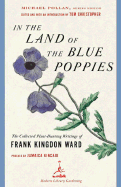The Yak Tea and Blue Poppies

Frank Kingdon Ward (1885-1958) breathed his last in a dull English pub, an unfitting end for the dashing plant explorer who trekked through Tibet, China, and Southeast Asia. Beginning in 1911, the diligent, savvy traveler collected 23,000 specimen plants in the course of his 24 long and dangerous expeditions into previously unknown (in the Western world, anyway) mountains and river gorges.
That he was brave and intrepid and changed our gardens forever might have been enough – but he was also a fine, direct, engaging writer. I can think of no better way to spend a snowy dark afternoon than in his company and with In the Land of Blue Poppies: The Collected Plant-Hunting Writings of Frank Kingdon Ward.
The blue poppy of the title is Meconopsis betonicifolia. Several species of blue poppies are found in Tibet, but Kingdon Ward brought the hopeful seed of this one woodland plant back to Britain:
“ [I]t will suffer less from the tricks of our uncertain climate; coming from a moderate elevation, it is accustomed to that featureless average of weather which we know so well . . .” he writes.
He was a brilliant and shrewd collector, training mind, eye, and hand over the years of his explorations. “[T]here are two phases of the work to be considered: plant hunting and seed collecting. Only years of experience in a region such as Western China justify the collector harvesting seeds of plants he has not seen in flower but even so he cannot be certain he is not collecting rubbish . . . He may know sufficient to recognize the capsule and foliage of a Primula when he sees one, for all fifty or so types into which the 500 species might be grouped; to recognize the beaked capsule of a Mencopsis with its lidded ports; the very characteristic capsule of a Rhododendron, for all its limitless variety; . . . But many . . . capsules are not dissimilar, and unless he has made a keen study of the genus, the most hardened collector is likely to go astray. The mastery of Rhododendron alone has now been elevated to an all time job . . .Yet there is much to be said for a journey across unexplored mountain ranges in winter, grabbing seed of anything which tickles the collector’s fancy.”
And he can be lyrical about plants. Here is his description of a mountain pass in Tibet, at 15,000 feet:
“[O]n the sunny lawns the glorious trumpet gentian . . . which opens its blue eyes in fine weather, and languidly closes them at the first sign of atmospheric trouble. It cares not. Indifferent to rain and snow and screeching wind, which rage overhead and even bury it, it shuts up like an oyster. When the storm has passed it peeps out, and satisfied, opens its eyes again. In a flash drab lawns are sparkling with blue, as though the dome of heaven itself had cracked and rained splinters on the grass.” (Note to seed catalogue devotees: it’s Gentian sino-ornata, K.W. 4859)
As illuminating as Kingdon Ward is about the plants and seed he collects, his writing about place and character – those unexplored mountain ranges in winter, peopled with the Tibetans who share his journey — are what allow us to see and touch and taste the Himalayas through this book.
“A narrowing valley stretched northwards in front of us,” he writes, “and was cut off abruptly by the converging mountain ranges. But the river came thundering out of a deep gash, and a mist of spray hung in the air. Beyond, the cobalt blue sky shut down tight, like a lid. I felt rather awestruck . . . noting the puffs of bright cloud shining against the violet hills. No white man had ever seen this valley before. The river was not less than a hundred miles long . . .”
He describes yak butter tea, frizzy with yak hair; the ho-p’an, an iron tray filled with charcoal beneath his bedroll at a rude inn — alight, it’s his sole source of heat in the dark, cold Himalayan winter. We see a Tibetan wedding; monks curious about a microscope; a deathly ill child; Kingdon Ward swinging across deep gorge on a twisted bamboo rope, where he had “a snap-view of the muddy river foaming below.” After the first time, he says, there was nothing he enjoyed more.
Kingdon Ward made his explorations in the time of empire and its accompanying attitudes about people of color. But the reader feels the writer’s admiration for the Tibetans and their love for their land transcending his bred-in-the-bone inner Kipling.
Editor Tom Christopher, in the introduction to the book, quotes Kingdon Ward’s diary of 1935, when he returned to Tibet:
“Sometimes I have almost wept with joy at the sight of the jungle, green and serene, the softly undulating water, smooth hills flaring out the distant plains. Now I greet the snow-covered hills and the dark coniferous forest with the same joy.”
And so do we.
In The Land of Blue Poppies
The Collected Plant-Hunting Writings of Frank Kingdon Ward
Edited by Tom Christopher
Introductions by Michael Pollan, Jamaica Kincaid
$13.95
(Modern Library Gardening, 2003)
